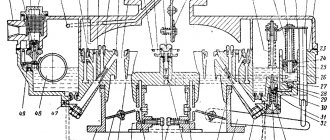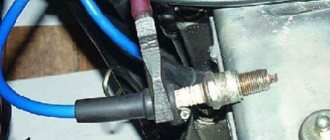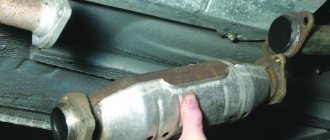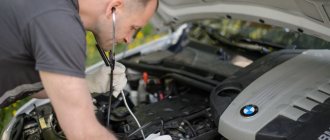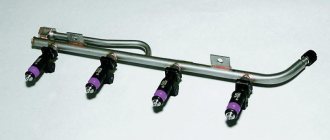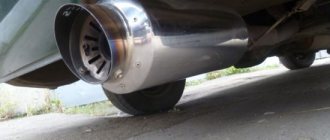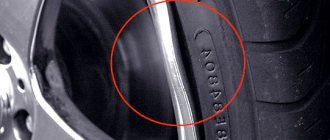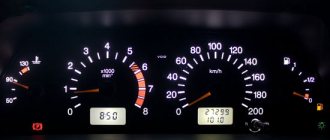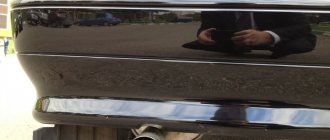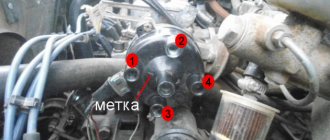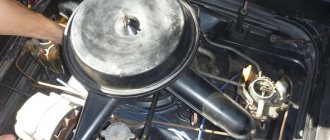Shoot the silencer Can be used on cars with both carburetor and injection engines. At the same time, oddly enough, the muffler itself has nothing to do with it. It is only a source of sound, and the factors causing loud sounds lie in completely different parts of the car.
Most often, the causes of popping sounds in the muffler are malfunctions of the ignition system , fuel supply or gas distribution system. Next, we’ll figure out how to get rid of the problem when it shoots into the exhaust pipe , and what you need to pay attention to first of all during “explosions.”
Why does it shoot at the silencer?
The main reason that the engine shoots into the muffler is unburned fuel that has entered the exhaust system and ignited in it. The greater the amount of gasoline that has leaked out, the louder the bang will be, and in some cases there may even be a whole series of “shots.” In turn, fuel can enter the exhaust system for various reasons. These could be malfunctions of the carburetor, timing belt, ignition system, various sensors (on injection machines) and so on.
The situation when someone shoots into the exhaust pipe can occur under different circumstances. For example, when over-accelerating, at idle speed of the engine or when relieving gas. As a rule, when there is a bang, a large amount of smoke . This malfunction is also accompanied by additional symptoms - loss of engine power, floating idle speed, increased fuel consumption. Let's look at the reasons why the muffler shoots in order, as well as methods for troubleshooting.
Clogged air filter
Air filters
One of the reasons why muffler pops is an incorrectly formed fuel mixture. To create it, you need gasoline and a certain amount of air. It enters the engine through a system that contains an air filter at the inlet. If it is clogged, it does not allow a sufficient volume of air to pass through it, so the result is a kind of “oxygen starvation” of the engine. As a result, gasoline does not burn completely , and some of it flows into the manifold and then enters the exhaust gas removal system. There the fuel heats up and explodes. Because of this, a kind of pop is produced in the muffler.
Eliminating the cause of this phenomenon is not difficult. It is necessary to check the condition of the air filter and replace it if necessary. This is especially true if you haven’t changed the filter for a long time, but according to the regulations, such a procedure already needs to be done. This is the simplest problem why the muffler shoots. Let's move on.
Carburetor not tuned
Car carburetor
Often the reason that the engine shoots into the muffler is an incorrectly configured carburetor. Its task is to create a fuel-air mixture, which is then supplied to the engine. If it is configured in such a way that the mixture is oversaturated with gasoline, a situation similar to that described above is created. The solution here is to check and adjust the “carb”.
The first step is to check the fuel level in the chamber where the float is located. Each carburetor is individually adjusted and has its own level. However, if its cover is removed, the float should be flush with the level of the cover. If this is not the case, adjust the level. Also be sure to check the integrity of the float . If it is damaged, fuel may leak into it, causing it to display the level incorrectly.
The reason that the carburetor shoots into the muffler may also be the jets. They are either configured incorrectly or become clogged over time. If the air jet does not supply enough air, the mixture becomes oversaturated with gasoline with the result described above. Often this malfunction occurs when the engine goes from idle to higher speeds, or with a sharp increase in speed (acceleration). It is necessary to check the condition of the jets and clean them if necessary.
| Air/fuel ratio | Description | A comment |
| 6/1 — 7/1 | Extremely rich mixture. Ignition failure. | Rich mixture. Long burning, low temperature. |
| 7/1 — 12/1 | Overrich mixture. | |
| 12/1 — 13/1 | Rich mixture. Maximum power. | |
| 13/1 — 14,7/1 | Slightly enriched mixture. | Normal mixture. |
| 14,7/1 | Chemically ideal ratio. | |
| 14,7/1 — 16/1 | Slightly lean mixture. | |
| 16/1 — 18/1 | Poor mixture. Maximum efficiency. | Poor mixture. Fast combustion, high temperature. |
| 18/1 — 20/1 | Over-lean mixture. | |
| 20/1 — 22/1 | Extremely lean mixture. Ignition failure. |
Faulty ignition system
Another reason that the fuel does not burn completely and popping sounds from the exhaust pipe can be heard is that the ignition is not set correctly. In particular, if the ignition is late , then popping noises in the muffler at idle and at high speeds are inevitable. This fact is very simple to explain. A situation occurs when a spark appears at the moment when the supply valve has already fully opened, as a result of which part of the fuel does not have time to burn, but leaks into the manifold. And if the ignition is “early” , then it will “shoot” at the air filter.
Late ignition can not only cause popping noises in the muffler, but also cause the intake valve to burn out over time. Therefore, do not delay with ignition adjustment.
Checking the spark plugs
Also, the cause of incomplete combustion of fuel can be a weak spark. In turn, this is a consequence of one of the facts:
- Poor contacts on high-voltage wires. It is necessary to inspect them and clean them if necessary. You should also check that there is no ground fault.
- Malfunctions in the operation of the distributor . It is also advisable to check its operation.
- Partially failed spark plugs . If at least one of them has exhausted its service life, this affects the power of the spark it produces. Because of this, not all fuel is burned. Check and replace spark plugs if necessary.
Use candles with the correct heat rating. This will provide the necessary and sufficient spark power to burn all the fuel.
Let's analyze situations for different cars
Now let’s look at the causes of the malfunction in relation to certain car models:
And other representatives of the domestic automobile industry are susceptible to the appearance of shots in the muffler. A common cause is a misconfiguration in the ignition system.
The spark fires, but with a delay, at the moment the exhaust valve opens, and not at the moment of greatest compression.
The result is that part of the combustible mixture ends up in the manifold.
The reasons may be the following:
If shots in the muffler appear when the gas is pressed in VAZ 2106 and VAZ 2109 cars (at low speeds), the cause may be a violation of the valve clearance.
In its absence, part of the fuel ends up in the collector, and the consequences in question become inevitable. The solution to the problem is to replace the valves or adjust them.
For cars of the brands in question with an injector, this problem is also typical, but it appears less frequently.
A common cause is a timing fault, incorrect ignition setting, or thermal gap failure.
Here it is recommended to check the correct operation of the sensors and the quality of the contact connections.
If these elements do not function correctly, the ECU system will not be able to distribute fuel correctly.
To identify such a problem, it is recommended to contact specialists at a service station.
VAZ 2114, VAZ 2115, injector.
Why does the muffler shoot but the engine won't start? If a breakdown is detected, it is recommended to start with the spark plugs and blow them out by cranking the starter and firing the gas to the floor.
The next step is to check the performance of the DPKV. The algorithm is as follows:
During braking by the ZMZ 402 engine, shots are heard in the muffler.
In such a situation, it is worth starting ignition checks and paying attention to the distributor. You can crawl through the hole of the latter and bend the whiskers, which will increase the tension of the springs.
The problem may arise if the car is parked on the street for a long time. Here's what you need to do:
Some car owners “sin” with the carburetor, but in ZMZ 402 engines it is rarely the cause of “shooting”.
Most often we are talking about misfires, so special attention should be paid to the ignition system.
One of the likely causes is contamination of the breaker contacts. After cleaning them, the problem should be resolved.
Why does it shoot at the muffler on a UAZ?
Owners of cars from the Ulyanovsk plant are also faced with the problem of shots fired during the start-up and movement of the car.
The reasons may be as follows:
Of the listed reasons, the most common are ignition problems.
There is another assumption - malfunction of the spark plugs due to the formation of water condensation on the high-voltage wires or under the distributor cover.
The spark hits the ground, and fuel floods the electrodes. In such a situation, it is necessary to change the spark plugs, distributor cap and wires. In 90% of cases the problem is solved and the motor runs without problems.
If the engine runs normally when cold with the choke tightened, this indicates the absence of failures.
There may be cases when the car “sneezes” when stopped. Here we can conclude about failures in the operation of the twentieth century system, as well as failures in the transition system.
There are two more possible reasons:
Why does it shoot into the muffler on Gazelle cars?
The general reason is one - the fuel does not burn completely. There are several options:
If the popping noise occurs not when you press the gas, but when you release it, the fuel mixture is too saturated with oxygen.
It is worth checking the operation of the octane corrector, and replacing the old carburetor tubes with silicone analogues. Often rubber products are damaged and it is not possible to find the fault.
Another possible problem is a slippage of the rod in the distributor. To check this fact, you need to remove the tube and create a vacuum with your mouth.
At this moment, you should look at the distributor - it should rotate, and when released, it should click.
Incorrect thermal clearance
The thermal gap is the distance by which individual parts of the engine increase in volume when heated. In particular, it is between the valve tappets and the camshaft cams. An incorrectly set thermal gap is one of the possible reasons why the muffler shoots.
Indirect evidence of an increase in the thermal gap may be increased noise during engine operation, as well as a decrease in its power. If the gap is reduced, this may cause gases to shoot into the exhaust pipe. This occurs due to the fact that a valve that is not completely closed allows gasoline to enter the manifold, from where it then enters the exhaust system.
The thermal clearance of the cylinder head valves can be adjusted. Therefore, to eliminate this problem, it is enough to adjust the valves. This procedure is always carried out on a cold engine.
Ignition timing
Now let's figure out how late ignition affects it.
Another reason that fuel explodes in the muffler is due to ignition problems.
To confirm or exclude this assumption, it is necessary to check the correct setting of the timing in the ignition system. If the latter is set up late, shots cannot be avoided.
This is due to the fact that the spark fires with a delay, already at the moment the exhaust valve opens. As a result, a certain volume of fuel ends up in the collector.
If you ignore the problem, there is a high risk of burning out the valves and exhaust pipe.
If there are no problems with the ignition, and it is configured correctly, shots still appear at the moment of starting or driving.
The reasons may be the following:
One of the reasons for the deterioration in spark quality is a problem with the spark plugs, so you need to unscrew each of them one by one and check the quality of the contacts.
Faulty timing belt
Malfunctions in the operation of the gas distribution mechanism are generally similar to problems with ignition. In particular, the exhaust valve opens at a time when the gasoline has not yet burned out. Accordingly, it enters the exhaust gas removal system, leading to the already familiar popping sounds in the muffler.
Gas distribution mechanism
There are several causes of malfunctions in the timing system:
- Timing belt wear . A sign of this malfunction is the appearance of additional metallic pops or noises when the engine is running at low speeds. In this case, you need to inspect the belt and, if necessary, tighten or replace it. You can read how to do this in the corresponding material.
- Worn toothed pulley . In this case, it is necessary to replace it.
- Partial valve failure . Over time, they become covered with soot (especially when refueling the car with low-quality gasoline), which leads to deterioration in the operation of the mechanism. And due to hanging valve springs, the engine overheats. Therefore, it is worth checking the valves. If you find slight roughness or bends on their surface, then grinding them in is a mandatory procedure. If the scratches are significant, you need to polish them or replace the valves.
Usually, if the timing belt is faulty, popping noises in the muffler are heard when the engine is warm . If the engine is “cold”, then they are not there. This is another indirect evidence of the timing's guilt. However, to find out exactly, it is necessary to perform additional diagnostics.
What's the result?
As you can see, popping sounds in the exhaust system directly indicate the need to check the power system, electronic control system, ignition system and gas distribution mechanism. It should also be taken into account that further operation of a car with such a problem leads not only to the rapid failure of individual elements of the exhaust system, but can also cause burnout of valves, local overheating and other malfunctions of the power unit itself. Please note that quite often popping noises in the muffler cause vehicle fires.
Finally, we would like to add that to maintain the cleanliness of the internal combustion engine and prevent carbon formation, you should use high-quality motor oils and observe the recommended replacement interval for lubricants and filters. This is especially important for engines with hydraulic compensators. Also, in order to eliminate possible problems with thermal valve clearances, you should follow all recommendations regarding maintenance and repair of the power unit.
Problems with injection cars
According to statistics, the problem of shots in the muffler is more often encountered by owners of carburetor cars. However, it can also occur with a fuel-injected car. However, their reasons for popping are different.
In such machines, the engine operation is controlled by the ECU based on information from numerous sensors. And if any of them gives false information, this leads to incorrect motor control. For example, if the air intake sensor is faulty, this will lead to incorrect formation of the fuel mixture. You should also check the crankshaft position sensor. If it provides information about a displacement of one tooth, this will also lead to incorrect operation of the system. The throttle position sensor, Hall sensor and other elements may fail.
The very first thing you should do is conduct computer diagnostics of your car. It will show which sensor or engine element is having problems. When the muffler is fired, it is also advisable to check the injector using computer diagnostics.
The car won't start
Another problem that car owners face is shots in the muffler at the time of start-up.
The situation looks like this. The driver tries to start the car, starting does not happen, but there are quiet shots in the exhaust system.
If nothing is done, the next attempt may be fatal for the muffler - there is a high risk of damage due to an explosion.
In such a situation it is worth:
Additional reasons
There are a number of other reasons why the exhaust pipe shoots. These include:
- Popping noises when idling the engine are possible for two reasons - a leak in the intake manifold, as well as a clogged idle system.
- Poor quality gasoline or gasoline with a low octane number. Try to refuel at reputable gas stations and use fuel recommended by the manufacturer of your car.
- Mixed spark plug wires . If, when replacing or checking spark plugs, you mixed up the wires connected to them, this will also be a likely cause of popping noises. In this case, the car may not start and “shoot” at the muffler.
- If your machine has an economizer , check its operation. Often the malfunction of this unit is also the cause of “shots”.
- Malfunction of the air damper . Check this element and adjust if necessary.
- One of the reasons when the muffler shoots when releasing gas is that the muffler downpipe ( “pants” ) is poorly screwed to the exhaust manifold. Check the tightness of the connection and tighten it if necessary.
- Another likely cause of popping noises is high performance fuel injectors (“leaking”). They supply too much fuel, which does not have time to burn completely, which leads to “shots”. There is a simple way to check. It is necessary to try to start the engine at high engine speeds (with the gas pedal depressed) (the so-called purge mode). If popping noises occur at this time, it means that at least one injector is leaking.
- In injection cars, late ignition and, as a result, popping noises can be caused by “fatigue” of the knock sensor . It can also respond to extraneous noises occurring in the engine. The operation of the sensor must be checked using computer diagnostics.
- If the muffler shoots when releasing gas , then one of the most common reasons for this is “burning” of the exhaust valves. Popping noises may also appear when descending a mountain in gear. Inspect and clean them.
- If your car uses a contact ignition system, then you need to check the gap on its contacts . Ignition problems, as described above, may be the reason that not all of the gasoline is burned.
- Leakage of the gas exhaust system . In this case, as a rule, single pops occur when the gas is released. First of all, check the gaskets at the connections of the pipes (catalyst, resonator, muffler).
Also, if lumbago occurs and traction deteriorates, it is recommended to check the fuel pressure in the system, as well as compression (cylinder tightness for leaks), and inspect the ignition coil.
Condensation in the muffler
The main reason for the formation of condensation in the muffler is the temperature difference between the ambient air and the muffler. Its formation in a car with a working catalyst is a natural phenomenon. It’s worse if it’s not there, but too much can cause corrosion. There is a Read more
As you can see, there are many reasons why a muffler shoots. Therefore, we advise you to start your diagnostics by checking the tightness of the exhaust system. Inspect the bolted connections and gaskets between its individual elements. This will save you time and money. This is especially true if popping noises are heard when releasing the gas or when descending a mountain in gear (when braking the engine).
If the audit does not give positive results, then it is necessary to check the operation of the carburetor, valves and other parts described above. This check is advisable if the muffler shoots when you press the gas .
Popping sounds from cars with HBO
Unfortunately, this problem also affects cars that use liquefied gas as fuel. According to statistics, owners of cars with injection engines and third-generation gas equipment most often encounter it.
Gas pops can be heard both in the intake manifold and in the exhaust system (in particular, in the muffler). There are two main reasons for this:
- There is no stable and sufficient gas supply . This occurs due to incorrect settings of the gas reducer or a clogged air filter. For fuel-injected cars, the culprit may be the mass air flow sensor (MAF). “Glitches” in its operation lead to incorrect operation of the electronics. That is, we get a lean or enriched gas mixture, resulting in popping noises.
- Incorrect ignition angle . In this case, the situation is similar to that described above. If the ignition is late, the muffler “slams”, if it is early, the intake manifold or filter.
Monitor the status of your HBO and its settings. Don't neglect problems when they arise. Otherwise, you may not only face expensive repairs, but also spontaneous combustion of the car’s power unit.
Conclusion
Popping noises from the exhaust pipe are signs of a non-critical , but rather unpleasant “illness”. In addition to external manifestations, the engine and exhaust system deteriorate, and excessive fuel consumption occurs, which leads to unnecessary waste of money for the car owner. Also, if the problem is ignored for a long time, the valve, exhaust pipe, resonator or muffler may burn out. In general, if such a breakdown occurs the machine can be used , but it is recommended to carry out repair work at the first opportunity. If you cannot or do not want to do them yourself, contact a service station for help.
Popping sounds in the injector
On injection engines, this problem is quite rare. When they appear, the cause is a phase failure, ignition fault or thermal gap, as in the case of carburetors. In addition to the above, such a breakdown may be the result of insufficiently reliable sensor contacts. In this case, incorrect data will be supplied to the control device, and the electronic control unit will manage the combustible mixture in accordance with such signals. In this case, only a thorough diagnosis of the car can identify the problem.
Of course, you can use the car when the engine fires, but this will lead to serious engine damage. Therefore, when such a malfunction occurs, it is best to immediately go to a service station.
The article is, of course, more of an overview - but it reflects all aspects of this problem; from experience I will say that often on injectors it is the belt that has stretched or jumped on a tooth.
A small but useful video, watch it.
I’ll end here, read our AUTOBLOG
Similar news
- Do-it-yourself muffler repair. With and without welding, plus detailed vi...
- Different compression in the cylinders. Why and what to do? Let's figure it out...
- Lost my cap | Don't overpay
